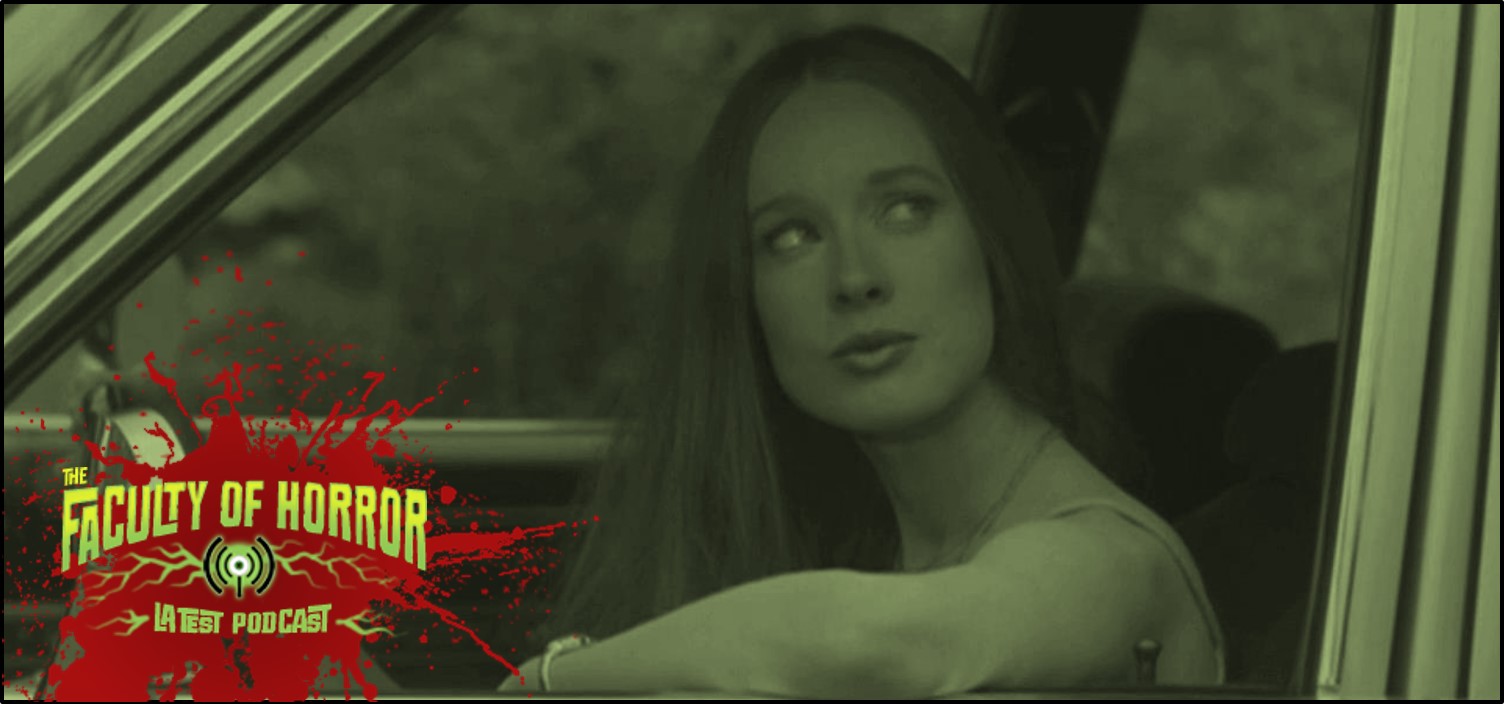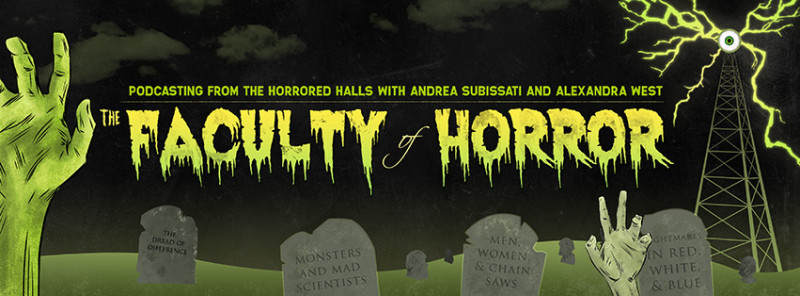 The discussion of rape and sexual violence has never been in our cultural conversation as much as it is now. In this episode, Andrea and Alex look at an exploitation classic and a contemporary award-winner to parse out how rape is depicted and how revenge is achieved, if at all.
The discussion of rape and sexual violence has never been in our cultural conversation as much as it is now. In this episode, Andrea and Alex look at an exploitation classic and a contemporary award-winner to parse out how rape is depicted and how revenge is achieved, if at all.
REQUIRED READING
I Spit On Your Grave. Dir. Meir Zarchi, 1978.
Elle. Dir. Paul Verhoeven, 2016.
EXTRA CREDIT
Support: Anti-Violence Centres in Canada, Rape, Abuse and Incest National Network hotline: 1-800-656-4673.
Roger Ebert’s contentious review of I Spit On Your Grave.
Social Dominance and Forceful Submission Fantasies: Feminine Pathology or Power? A 2009 article by Patricia h. Hawley and William A. Hensley from the Journal of Sex Research.
Andrea’s appearance on the Rue Morgue Podcast discussing I Spit on Your Grave.
LISTEN
Right click or option-click here and choose “Save Target As…” to download the mp3.
Podcast: Play in new window | Download

Another excellent episode, Professors, so thank you. Every episode is worth the wait. I really love the time you two take in both preparing and polishing your episodes.
One thing I’d like to contribute is the use of the term ‘revenge’ for this genre, which I think is entirely meaningful, as opposed to retribution or payback. Most revenge stories worth their salt are naturally complex, mainly because revenge stems from a crime that is extremely personal and emotionally damaging. Pursuing revenge then gets complicated because the ensuing violence, while justified, often adds trauma, and the avenger is faced with committing crime in response to being the victim of one. Those friggin Bronson movies may have tried to sell vengeance as the obligation of the Good Guy, but the larger (and better) tradition examines vengeance as something not so cut-and-dry, and I really loved your appreciation of those spirals in these movies.
PS–just read the Ebert review and found it HIGHLY unfortunate. I guess he felt he was high on the saddle condemning the guy cheering on the rapes and thought taking on the feminist would make for equal time? Ugh.
Though it isn’t Quite the same sort of film, a contrasting view with MARTYRS would be illuminating as well, I think.
I just found this podcast and have been mainlining it. I love how deep your commentaries go and how it isn’t just opining. Small complaints, though: your musical intro is very long, and as much as I love trailers, I don’t really get anything out of hearing them in their entirety. I can’t fast forward through them either without downloading the mp3. I’d love for those noise vacuums to be filled with more of your awesome thoughts!
I’d been looking forward to this episode for a long time just because the rape and revenge topic is so conflicting for me. I like to think of myself as a pacifist who doesn’t condone violence in any form. However in The Girl With the Dragon Tattoo, when Lisbeth Slander tattooed “I am a sadistic pig & rapist” on her guardian’s stomach and sticks a massive dildo up his ass, I was cheering for her and applauding her revenge.
While I can’t comment much on I Spit on Your Grave because I have regrettably only seen the remake, I found Elle to be extremely fascinating but also disturbing and uncomfortable.
Regarding Patrick’s death, wasn’t there a scene in the movie where Michelle tells him something like, “I’ll have to do with you what I did to my father” when they are driving home from the party? Soon after that, he attempts to rape her one last time, and her son comes in a kills Patrick with the log. Her comment and Patrick’s death makes me think she intentionally set him up to die and have him killed inadvertently. Same with her father — the prison notified him she was coming to visit, and he hung himself. I’m not saying she knew her dad would kill himself — it’s just interesting given her comment to Patrick in the car. It’s like she’s having someone else take care of business for her. This notion also leads me to believe maybe she had some sort of involvement in her father’s murderous spree. We never really know her true role in the murders, but maybe she manipulated and set him up to murder others. Granted I also found Michelle to be a very manipulative person from the get-go, especially when it comes to her relationship with Patrick after his identity is revealed and her mother.
Your discussion on rape erotica also reminded me of the early 2000 tv series Bliss, and the episode “The Footpath of Pink Roses”. Being Canadian, I hope you’ve seen this gem of a series. In the states, my friends and I used to watch it in college after Sunday Night Sex Show. There was one episode where a girl is taking martial arts classes and begins to fantasize about rape. She tries to get her boyfriend to fulfill these fantasies, but he is unwilling. Finally, she and her martial arts instructor act out a rape role-play in a field and she looks very pleased in the final frame.
http://www.imdb.com/title/tt0527021/?ref_=ttep_ep8
Also, being the Verhoeven fan that I am, don’t forget the rape/revenge scene in the wonderful classic Showgirls. Nomi beats the crap out of the long-haired rock star after he and his entourage brutally rape and beat her best friend Molly. He also deals with a complex sexual relationship in Black Book between Rachel/Ellis and the Nazi, Müntze, she is spying on. While she only begins sleeping with him to learn information for the Resistance, they soon fall in love. She even attempts to save him after the war ends and Canadians begin to punish the Nazis. But as you mentioned from the beginning with Basic Instinct, Verhoeven has a interesting cinematic relationship with sex in lots of his films.
Hey guys, I appreciated this episode, but I don’t think I agree with you. While I believe that Meir Zarchi had good intentions, I think this films crosses some lines it needn’t cross. Specifically, the rape scene is far too long. I actually timed it once, and it is 26 minutes long. That’s an entire third of the movie. I have to wonder if it is absolutely essential to show a woman being gleefully brutalized for 26 minutes to make a point that it’s not okay to gleefully brutalize someone.
I have also read Ebert’s review, and I agree with him somewhat (not entirely). I think it is important to consider the context in which he saw the film. He describes being in an audience full of men who were cheering on the rapists. I myself have been the only woman in the room during a rape scene before, and it is absolutely terrifying. How can a film be sending the message it intends to send if a room full of whooping misogynists is the direct result of said film?
I also take issue with the use of sexuality to get revenge. Not to put too fine a point on it, but I’ve survived sexual violence and I would never in a million years allow the perpetrator to touch me again. I understand your point about using whatever agency she has, but I think a better statement would be to suggest she has agency outside the malicious use of her body. Frankly, this choice in the film felt excruciatingly male to me. And I don’t need more male perspectives of sexual violence. The film, ultimately, reduces her again to just the body she inhabits, and that is very disappointing.
One thing that you mentioned that I did wholeheartedly agree with is that it is BETTER when the woman gets the revenge. I think we are too often stuck with the trope that the woman is defiled and so must die in the film and then be avenged. I saw all this despite the fact that I think Last House on the Left is a far superior film. The choice of not having Mari live was Craven and Cunningham’s major misstep.